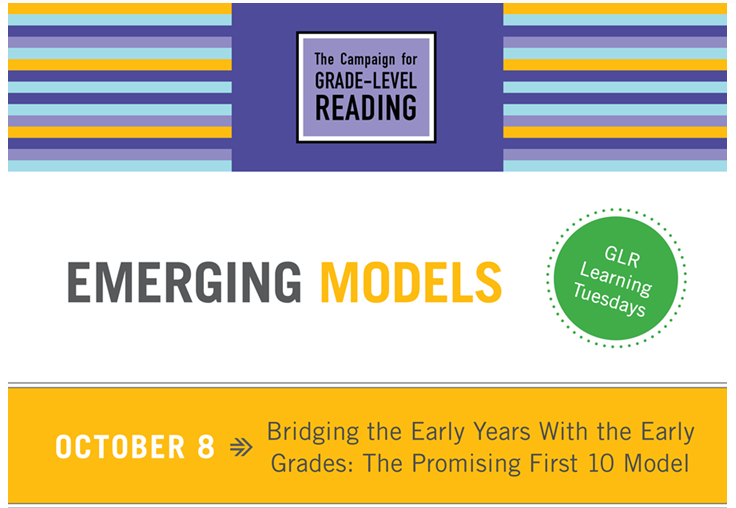Evaluation of the First 10 Pilot

An evaluation brief by the American Institutes for Research® (AIR®) shares findings from the first year of implementation in Michigan communities, including successes and challenges. The brief outlines the following successes: The First 10 Model Is Designed to Adapt to Local Context. First 10 Pilot Sites Addressed Barriers That Limit Families’ Access to School Readiness Services. Joint…
School Leader Perspectives on First 10 Partnerships: New Video
First 10 is excited to share the first in a series of short videos to spotlight the work of First 10 partnerships nationwide. In First 10, community agencies, families, Head Start, child care, preK, and schools form partnerships and take action to ensure all children learn and thrive. We’ll be sharing a variety of perspectives…
Hear from First 10 Leaders: Campaign for Grade-Level Reading Webinar on 9/27

We are really excited to have this discussion with a fantastic panel of First 10 leaders. First 10 school-community partnerships bring together elementary schools, early childhood programs and community organizations to improve outcomes for children ages 0 to 10 and their families. Communities in six states are implementing coherent First 10 plans that include transition…
Hunt Institute Webinar this Thursday: First 10 in Action
I’m really looking forward to this conversation with Dan Wuori of the Hunt Institute about the great First 10 work underway in Maine and Pennsylvania. We’ll also talk about similar initiatives in Alabama and Rhode Island. I hope you can join us. You can register by clicking the link here.
Spotlight on Closing the Achievement Gap for Young Students: Social Justice, Virtual Learning, COVID, and Beyond
Was recently surprised and honored to be included in the Education Week Spotlight. See articles on COVID-related learning loss, advice from Nell Duke, the impact of phonics on math, our national racial reckoning, and First 10. Spotlight on Closing the Achievement Gap for Young Students
Improving the Transition to Kindergarten in Rhode Island (and a great Transitions resource)

My colleagues and I at EDC have been busy supporting First 10 work, including in Maine (13 communities and an inter-agency state First 10 team), Rhode Island, Lancaster County, PA, and Worcester, MA. First 10 in Pennsylvania is now expanding to include the 7-county South Central region of the state. I’ll be posting lessons…
Campaign for Grade Level Reading Webinar: First 10 School and Community Partnerships

The Campaign for Grade Level Reading is holding a webinar on First 10 School and Community Partnerships on October 8 from 3:00–4:30 ET.. Please join me, Cris Lopez Anderson (Buffett Early Childhood Institute), and Brooke Chilton-Timmons (Multnomah County Department of Human Services) to learn about the exciting work happening in these communities. You can find…
Initiative aimed at helping children get a better start in life offers real promise
A strong editorial statement on P-3 by the Lancaster County newspaper, the Lancaster LNP: “It’s devastating to think that as early as infancy, a child might be deemed to be “at-risk” — that is, at risk of failing in school, of being trapped in poverty, of even facing a diminished life expectancy. ‘The achievement gap…
What Pre-K Means for Your Pre-teenager (New Tulsa Findings)
“The Preschool Fade-Out Effect Is Not Inevitable”
In Education Week by Stanford professor Deborah Stipek: “Is fade-out inevitable? No. Studies have shown definitively that investment in preschool can yield sustained effects and significant social and economic returns. But fade-out is common and remains a persistent reminder that simply providing preschool to low-income children is not sufficient to achieve long-term benefits. If we…